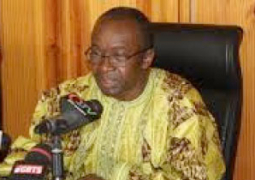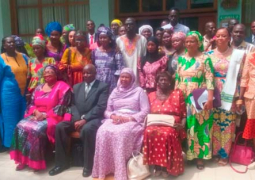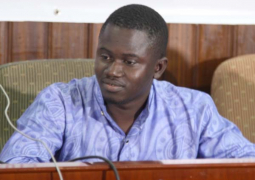President Yahya Jammeh Thursday afternoon received members of the Lands Enquiry Commission, who were at State House to submit their report to the Gambian leader.
The 10-member Lands Commission, set up in August last year, was among others tasked with the responsibility of looking into matters of land allocations in the country focusing on key issues like illegal sales and administration of lands, and illegal allocation.
The three-volume report, presented to the Gambian leader by the chair of the Commission, Justice Basirou Vassilli Portier Mahoney of the High Court, among others covered recommendations, visits to all the regions and layouts in the country, as well as findings of the Commission.
Speaking at the ceremony, President Jammeh deplored the menace of corruption in our society, noting that The Gambia cannot afford to condone corruption in whatever form with its meager resources.
While commending the Commission and members of the public for their efforts, Jammeh expressed the need for the Commission to be transformed into a permanent anti-corruption commission.
“Some of us have to be soldiers, put our lives on the line, so that the independence of this country will be guaranteed. It’s not easy, but I think that will help curb corruption.
“We are also going to look at our laws to make them more stringent just like we did for drug dealers, because it is necessary to put an end to corruption,” he said, adding that “we have to fight corruption tooth and nail, if we want to achieve the Vision 2020 and beyond and sustain it”.
According to him, the nation’s meager resources must be jealously guarded for the benefit of all. The Gambian leader warned that stringent legislations will be put in place to curb the devastating menace.
He noted that for almost 16 years of his stint in power, he had never received a most comprehensive, or thorough commission report as the one presented by the Lands Commission.
“Looking at some of the pages of the report, it is very funny and interesting as well – that you can have a building as beautiful as these pictures contained in the report and still nobody came to claim for them.
“It is very strange that a house as beautiful as this contained in the report has no owner. But what is important is that when the Commission was inaugurated, I stated that there are buildings whose owners would not be traced, but I am clearly vindicated with this report,” he said, adding further that there could only be one reason for the so-called owners not showing up.
“The buildings were corruptly obtained illegally, and built illegally.”
Jammeh also noted that the recommendations in the Lands Commission report will be upheld to the letter, and that those found wanting will be prosecuted accordingly.
The Vice President and Minister for Women Affairs, Isatou Njie-Saidy, who also spoke at the ceremony, commended the Gambian leader for his foresight in setting up the Commission, noting that when a sector of the society is unhappy, it is the responsibility of the government to look at the cause of that unhappiness.
She stated that for the government to avoid being accused of taking sides, it usually sets up an independent body or commission that is composed of independent people who look at these issues critically, so that there is no bias in the final analysis as regards the recommendations.
According to Vice President Njie-Saidy, land is a resource that can be a source of conflict, since people use it for a variety of purposes.
In presenting the report, Justice Mahoney stated that their enquiry covered all the five regions in the country and parastatals, including the Assets Management and Recovery Corporation, the Social Security and Housing Finance Corporation, and the Gambia Tourism Authority.
According to chairman Mahoney, the Commission had a total number of 354 declarations from individuals and 81 complaints during their sittings.
“The enquiry was held in public and I can say it was independent and transparent,” he stated.
Read Other Articles In Article (Archive)




